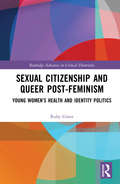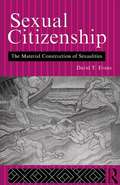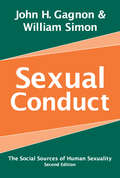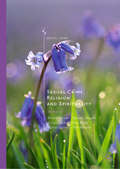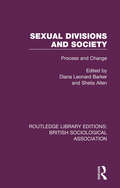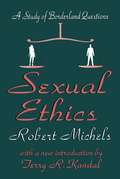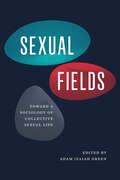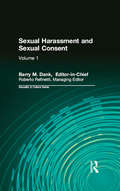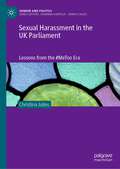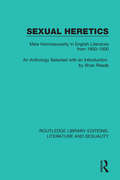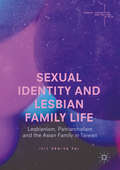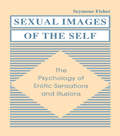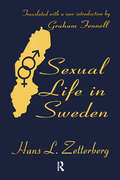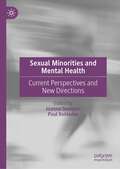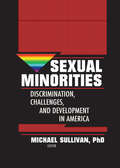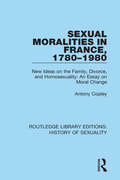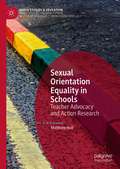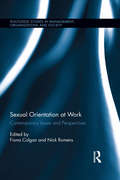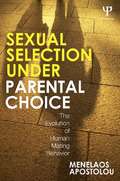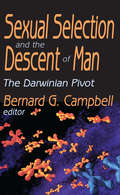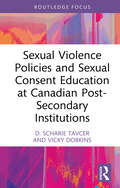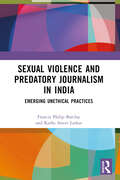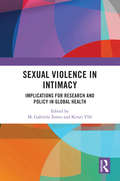- Table View
- List View
Sexual Citizenship and Queer Post-Feminism: Young Women’s Health and Identity Politics (Routledge Advances in Critical Diversities)
by Ruby GrantSexual Citizenship and Queer Post-Feminism makes new connections between post-feminism and queer theory to explore the complexities of contemporary gender and sexuality. In a wide-ranging examination of sex education, safe sex, and sexual healthcare, this book demonstrates how queer post-feminist discourses practically shape young women’s lives. Bisexual, pansexual, non-binary, queer. With the ever-expanding scope of gender and sexuality categories, some feminists have bemoaned a "shrinking of the lesbian world." But how do young women understand these identity politics? Drawing on extensive interviews with queer young people, this book offers a timely exploration of the links between identity, sex, and health. Utilising cross-disciplinary perspectives grounded in international social science research, this book will appeal to students and scholars with interests in sexuality and sexual health and those in the fields of gender and sexuality studies, public health, social work, and sociology. The book also offers implications for practice, suitable for policy-makers, health practitioners, and activist audiences.
Sexual Citizenship: The Material Construction of Sexualities
by David EvansThis enthralling and provocative book provides a new grounding for the understanding of sexual rights. It argues that all varieties of sexuality under capitalism are materially constructed out of the complex interrelationship between the market and the state. The examples of different sexual rights and lack of rights that it examines include the experience of male homosexuals, bisexuals, transvestites, transsexualists and children. Meticulous, focused and challenging, it will be required reading for anyone interested in modern human sexualities.
Sexual Conduct: The Social Sources of Human Sexuality (Social Problems And Social Issues Ser.)
by William SimonThe first edition of Sexual Conduct, published in 1973, swiftly became a landmark text in the sociology of sexuality. It went on to profoundly shape the ideas of several generations of scholars and has become the foundation text of what is now known as the "social constructionist" approach to sexuality. The present edition, revised, updated, and containing new introductory and concluding materials, introduces a classic text to a new generation of students and professionals.Traditional views of human sexuality posit models of man and woman in which biological arrangements are translated into sociocultural imperatives. This is best summarized in the phrase "anatomy is destiny." Consequently, the almost exclusive concern has been with the power of biology and nature in sexual conduct as opposed to understanding the significance and impact of social life. In Sexual Conduct, Gagnon and Simon lucidly argue that sexual activities, of all kinds, may be understood as the outcome of a complex psychosocial process of development. Using the social script theory, the authors trace the ways in which sexuality is learned and fitted into particular moments in the lifecycle and in different modes of behavior.Sexual Conduct is a major attempt to consider sexuality within a non-biological, social psychological framework. It is a valuable addition to the study of human sexuality, and will be of interest to students of sociology, psychology, psychiatry, social work, and medicine.
Sexual Crime, Religion and Spirituality (Sexual Crime)
by Nicholas Blagden Belinda Winder Helen Elliott Kerensa Hocken Rebecca Lievesley Phil BanyardThis book offers a collection of original contributions to the literature on sexual crime, religion and spirituality. Does religion help people desist from sexual crime? Can it form the basis of interventions to rehabilitate people? Or does it provide justification and opportunity for committing it? What do the perpetrators say about their faith? What about the victims and survivors of sexual crime? The book asks and answers these questions and more in a unique collection of chapters – from academics, chaplains and prisoners. The book begins with an exploration of the role, history and development of chaplaincy in the prison system over the years, before providing a more personal look through the eyes of the Lead Chaplain at Rampton High Secure hospital in the UK. Subsequent chapters weave together theories of desistance from sexual crime, and analyses of perpetrators’ accounts of their offending are also offered, alongside firsthand accounts of prisoners from a range of religions. The book concludes with a thoughtful journey through the book by the Lead Chaplain at HMP Stafford, UK. It will provide fresh insights for students and scholars of psychology, criminology, theology and social work, as well as for practitioners, chaplains, and readers with an interest in learning about sexual crime, religion and spirituality.
Sexual Diversity in Young Cuban Cinema
by Margaret G. FrohlichThis book explores how young Cuban filmmakers have expanded the range of sexual subjectivities on screen. It analyzes cine joven (films made by young directors) from the late 1980s to the early 2020s, film reviews, articles, and materials from the Cinematheque of Cuba's archive to illustrate the confluence of sexuality, cinema, and discourses of youth. While sexual and cinematic cultures have their own unique relation to the public sphere, state institutions, and transnational flows, this book explores tensions, debates, and expressions that unite them. In an investigation of how young filmmakers employ queer strategies of self-making to bring sexual diversity to the screen, Margaret G. Frohlich shows us how cine joven takes part in the socialization of power in Cuba.
Sexual Divisions and Society: Process and Change (Routledge Library Editions: British Sociological Association #2)
by Diana Leonard Barker and Sheila AllenOriginally published in 1976, Sexual Divisions and Society argues that mainstream sociology has neglected to incorporate the notion of sexual divisions as an integral part of its theoretical underpinnings. It suggests that sociology has often included women completely within the term of ‘men’, or as a part of their husbands, rather than asking how and when the relationship between the sexes is pertinent to the explanation of social structure and behaviour. The volume is composed of papers brought together from the 1974 British Sociological Association Conference on Sexual Divisions.
Sexual Ethics: A Study of Borderland Questions
by Robert MichelsIn his treatment of the issues raised by the movements of women for equal rights a century ago, Michels anticipated controversies and conflicts about which people care deeply today. He took a clear position in support of the desirability of equality between the sexes. In consequence, it remains relevant to current debates within feminism over equality and difference and the corresponding challenge to, and feminist critique of, social science arising from the (re) emergence of "difference" feminism.Sexual Ethics constitutes both an analysis of the "woman problem" and a document describing the wars between the sexes during this period and an important and overlooked piece of history of the classic sociological tradition. Michels observed that the national and economic conflicts in modern Europe were vast in scale and revealed sharply sensed injustices, and also that sex antagonisms are becoming more acute. He presented an argument, consistent with his theoretical position, about the seriousness of women's rights. Michels' discussions of sexuality, sexual morality, and the relations of the sexes had as its stimulus "the new sexual ethic" advocated by feminists. He pointed out that true equality required equality of rights to sexual liberty for women or chastity prior to marriage for men.Michels supported premarital chastity for men as an ideal, but he doubted that very many would practice it. Michels was virtually alone in the sociological tradition in seeking to illuminate the "struggle for love" between men and women by reference to the "erotic coquetry" in the sexual behavior of "lower animals." Despite his stand for equality of men and women in sexual matters, a recurrent theme in Sexual Ethics is that men are sexually more aggressive than women, at least in part due to social structures and cultural traditions. Michels advocated family planning (but opposed abortion) in the interests of marital and family happiness and economic well-being, especially for the poor.In his new introduction, Terry R. Kandal discusses Robert Michels' life. He explores, among other topics, Michels' treatment of the woman question and the reactions of Michels' contemporaries to the same question. He also discusses the feminist critique of social science, and the place of Michels in and the gender questions of our times. The book will be of particular interest to those interested in the history of relations between men and women as well as those interested in questions of biological determinism.
Sexual Fields: Toward a Sociology of Collective Sexual Life
by Adam Isaiah GreenIn the late modern period, an unprecedented expansion of specialized erotic worlds has transformed the domain of intimate life. Organized by appetites and dispositions related to race, ethnicity, class, gender, and age, these erotic worlds are arenas of sexual exploration but, also, sites of stratification and dominion wherein actors vie for partners, social significance, and esteem. These are what Adam Isaiah Green calls sexual fields, which represent a semblance of social life for which he offers a groundbreaking new framework. To build on the sexual fields framework, Green has gathered a distinguished group of scholars who together make a strong case for sexual field theory as the first systematic theoretical innovation since queer theory in the sociology of sexuality. Expanding on the work of Bourdieu, Green and contributors develop this distinctively sociological approach for analyzing collective sexual life, where much of the sexual life of our society resides today. Coupling field theory with the ethnographic and theoretical expertise of some of the most important scholars of sexual life at work today, Sexual Fields offers a game-changing approach that will revolutionize how sociologists analyze and make sense of contemporary sexual life for years to come.
Sexual Harassment and Sexual Consent
by Barry M. Dank and Roberto RefinettiSexual Harassment and Sexual Consent serves as a compelling forum for the analysis of ethical, cultural, social, and political issues related to sexual relationships and sexual behavior. These issues include, but are not limited to: sexual consent and sexual responsibility; sexual harassment and freedom of speech and association; sexual privacy; censorship and pornography; impact of film/literature on sexual relationships; and university and governmental regulation of intimate relationships.The premier volume deals with a central theme: sexual harassment and sexual consent, with emphasis on academia. Theoretical articles, research reports, editorials, and book reviews analyze issues from psychological, sociological, political, and artistic perspectives. Contributions include: "Eight Reasons Not to Prohibit Relationships between Professors and Students" by Peg Tittle; "The Impact of Sexual Misconduct on the Reputation of Martin Luther King, Jr." by A. B. Assensoh and Y. Alex-Assensoh; "Homosexuality, Sexual Harassment, and Military Readiness" by Deborah E. Kapp and Gary A. Kustis; " and "College Students' Perceptions of the Relationship between Sex and Drinking" by Gwendell W. Gravitt, Jr., and Mary M. Krueger.Also included are reviews of Sexual Harassment on Campus edited by B. R. Sandler and R. J. Shoop; Making Gender: The Politics and Erotics of Culture by S. B. Ortner; The Power of Beauty by N. Friday; Bound and Gagged: Pornography and the Politics of Fantasy in America by L. Kipnis; and Mediated Sex by B. McNair. In addition, Warren Farrell reviews the film First Wives Club. This initial volume of Sexuality and Culture will be of interest to all those who participate in campus life as well as sociologists, psychologists, and government and university policymakers.
Sexual Harassment in the UK Parliament: Lessons from the #MeToo Era (Gender and Politics)
by Christina JuliosThis book examines the phenomenon of sexual harassment in the UK Parliament and efforts to tackle it. The volume’s in-depth research unveils a political culture where sexual transgressions thrive. Its intersectional feminist perspective furthermore highlights multiple systems of gendered oppression perpetuating inequality. Britain’s experience is viewed against the global #MeToo movement and Hollywood’s Weinstein sex scandal. The book identifies ways to redress the status quo and challenges ahead, including a gender power gap, misuse of non-disclosure agreements to silence victims, and misogynistic organisational cultures.
Sexual Heretics: Male Homosexuality in English Literature from 1850-1900 (Routledge Library Editions: Literature and Sexuality #7)
by Brian ReadeThe years between 1850 and 1900 were the vintage years of a discreet homosexual culture in England. In this period, educational, personal and foreign influences all contributed to the establishment of a trend expressed in the works of authors such as John Addington Symonds, Walter Pater, and A.E. Housman, and in those of lesser writers, now largely forgotten. This book, first published in 1970, is an anthology of English prose and verse, either homosexual in tone or providing a vehicle for homosexual emotions, and in several examples even overtly and experimentally frank. The book includes an introduction by Brian Reade explaining the network of friendships and associations which underlay this development and tracing some of its origins.
Sexual Identity and Lesbian Family Life
by Iris Erh-Ya PaiThis new book illustrates how Taiwanese lesbians negotiate their lives outside patriarchal families, while seeking varying ways to maintain working relationships with their families of origin, as their notion of family distinguishes them from same sex couples in other countries. This ambivalence has a strong influence on their relational decisions as they deal with contradictions between family ties, filial piety and lesbianism. Based on individual and couple interviews with self-identified lesbian couples in stable relationships, the book offers vivid narratives of different ways in which Taiwanese lesbians have been able to make sense of their families without recognition by legislation or their families of origin. Specific issues in Taiwan raised in the book challenge the taken-for-granted understandings of same-sex relationships and review the dramatic transformations that have profoundly changed womens' position. It also offers a sensitive analysis of GLBT issues and heteronormativity, arguing that Chinese familialism can cohabite with lesbianism in the context of contemporary Taiwan.
Sexual Images of the Self: the Psychology of Erotic Sensations and Illusions
by Seymour FisherThis volume documents how sexual practices and fictions infiltrate and are influenced by a person's feelings about the self and the body. Using paradigms derived from self and body image theory, Fisher combines research from the past several decades dealing with sexual behavior to test major theories concerning diverse sexual phenomena. The book integrates, within a broad conceptual scheme, research findings concerning major aspects of sexual behavior such as the development of sexual competence, orgasm consistence, clitoral versus vaginal preference, and homosexuality.
Sexual Life in Sweden
by Hans ZetterbergNow available in English, Sexual Life in Sweden is a classic piece of sex research by one of Sweden's most distinguished social scientists. Sponsored by the Royal Commission on Sex Education more than thirty years ago, it remains the only study of sexual behavior in a randomly selected adult population sample ever funded by a government. Because an astonishing response rate was achieved (91 percent) during the course of Zetterberg's research, the claim that Sweden is one of the few countries where generalizations about national sexual behavior can be made may be stated with confidence. Zetterberg's study matches the gender of interviewers to that of subjects. From a theoretical perspective, Zetterberg analyzes the change in Sweden from a "restrictive" to a "contraceptive" society. The study makes it clear that, with over 1,000 acts of intercourse for every live birth, 90 percent of sexual activity between consenting adults in modern Sweden does not result simply for procreation. Nevertheless, the research yields a picture of a highly responsible society. Zetterberg explores the emergence of two powerful new norms: "when having sex, you must use contraception," and "when in an existing sexual relationship, you must not start another one." He also examines the issue of abortion as part of a concept of social justice. The author compares the behavior of those who experience an unwanted pregnancy with those who do not, and explains that abortion is seen by Swedes as part of the provision of the welfare and social justice system. Included is an examination of the sexual behavior of young people-the age of their first sexual experience, the circumstances surrounding it, whether positive parental involvement in their children's lives has any influence on their sexual conduct, and sex education programs in the schools. This translation of Zetterberg's study has been prepared by British sociologist Graham Fennell, who also authored a new introduction positioning Zetterberg's work in the history of sex research and comparing its findings with contemporary studies in Scandinavia, Western Europe, and North America. In light of the ongoing controversies about sex education, its conclusions remain relevant to policy discussions today
Sexual Minorities and Mental Health: Current Perspectives and New Directions
by Poul Rohleder Joanna SemlyenThis edited book presents a comprehensive guide to the research, challenges and differing perspectives within mental health for sexual minority populations in the UK. Drawing on clinical, social, health and community psychology perspectives, it brings the urgency of this topic back to the fore, providing insight into some of ways we understand and make sense of the increased prevalence of poorer mental health in these populations. Using an intersectional approach, a broad range of experts from across academia and practice explore the specific threat and discrimination faced by sexual minorities and investigate the high prevalence of poor mental health, health risk behaviours and psychological distress in these groups. The volume also offers innovative insight as to ways in which the disparities experienced by sexual minorities may be addressed. Ideal for practitioners in mental health and sexuality, as well as psychologists, policy makers, and academics alike interested in mental health, sexuality, public health, psychotherapy, psychoanalysis, or counselling, this collection features wide array of qualitative and quantitative sources to describe the current state of the art with an interdisciplinary lens.
Sexual Minorities: Discrimination, Challenges and Development in America
by Michael K. SullivanExplore the crucial issues facing the GLBT population in their struggle for acceptance in contemporary America! Sexual Minorities: Discrimination, Challenges, and Development in America examines the stumbling blocks that prevent gays, lesbians, bisexuals, and trangenders from living wholesome, healthy lives. This book concentrates on the effects of outside influences on the homosexual psyche from adolescence to mid-life and programs and services that need to be developed to improve quality of life. While some outside influences can make positive changes-such as Internet-based outreach to educate men in chat rooms about HIV-sexual minority groups face negativity from society in the forms of homophobia and heterosexism. Sexual Minorities uses statistics, charts, graphs, and surveys to reveal a remarkable trend correlating how contemporary American society treats sexual minorities and how it affects their psychological and psychosocial health. This book also reveals how-when internalized- this hurtful discrimination can cause self-hatred and depression. Each chapter focuses on a different aspect of the GLBT population, including: the history of homophobia and intolerance toward homosexuals with its basis in cultural, religious, and sociological views an in-depth survey utilizing Erikson&’s psychosocial model to determine the lifespan development of seven "out" gay males who discuss their coming-out period, their roles in society, their legacies, and later-life issues the lack of federal legislation protecting GLBT employees in the workplace and recommendations for creating a sense of security for these employees a case study revealing the high incidence rate of heterosexism amongst social workers and the repercussions this could have among homosexual clientele surveys and statistics investigating the rate of abusive behavior in lesbian relationships three chapters involving specific issues of gay, lesbian, and bisexual adolescents, such as coming out, risk and protective factors, and being homosexual in a rural environment as opposed to a city Sexual Minorities is an important tool for everyone in today&’s society-from students and practitioners of social work, health care, human sexuality, psychology, and sociology, to legislators, lawyers, activists, and business owners. This book is also vital for every parent, relative, or friend of a man or woman labeled as a sexual minority.
Sexual Moralities in France, 1780-1980: New Ideas on the Family, Divorce, and Homosexuality: An Essay on Moral Change (Routledge Library Editions: History of Sexuality #3)
by Antony CopleyOriginally published in 1989. This is the first history of modern France to explore the long-term origins of the libertarian revolt. It traces the moral history from the eighteenth century to the 1960s, examining the questions of marriage and divorce, homosexuality, and sexual morality. It includes detailed chapters on the Marquis de Sade, Charles Fourier, André Gide, and Daniel Guérin in order to illustrate the changing legislation, popular thought and public opinion. The result is an enlightening and provocative account which will be of interest to students of modern French history, moral thought and the history of sexual attitudes.
Sexual Orientation Equality in Schools: Teacher Advocacy and Action Research (Queer Studies and Education)
by Matthew HoltThis book explores how to help teachers become better advocates for sexual orientation equality in secondary schools. Examining this issue through the lens of qualitative emancipatory action research, a group of Australian teachers embarked on a journey of teacher advocacy. Critical theory has long highlighted teachers as key players in either challenging dominant social narratives, or else perpetuating oppressive systems of power through traditional forms of education. Despite this important role, the life stories of teachers, which contributed to the development of their beliefs and behaviours about sexual orientation are rarely considered in the development of anti-discriminatory policy, designing the curriculum and most importantly, in teacher training. This book suggests and frames a model for advocacy, whereby teachers engage with their personal beliefs about sexual orientation, with their role as a teacher, and commit to advocacy through action by promoting student safety, challenging heteronormative narratives and role modelling compassionate behaviours in their school environments.
Sexual Orientation at Work: Contemporary Issues and Perspectives (Routledge Studies in Management, Organizations and Society)
by Nick Rumens Fiona ColganSexual Orientation at Work: Contemporary Issues and Perspectives brings together contemporary international research on sexual orientation and draws out its implications for lesbian, gay, bisexual, trans and heterosexual employees and managers. It provides new empirical and theoretical insights into sexual orientation employment discrimination and equality work in countries such as South Africa, Turkey, Australia, Austria, Canada, US and the UK. This book is novel in its focus on how sexual orientation intersects with other aspects of difference such as age, class, ethnicity and disability. It adopts new theoretical perspectives (e.g. queer theory) to analyze the rise of new ‘gay-friendly’ organizations, and examines important methodological issues in collecting socio-economic data about sexual minorities. Providing an accessible account of key issues and perspectives on sexual orientation in the workplace, Sexual Orientation at Work caters to a wide range of readers across business, feminist, and LGBT/Queer Studies fields.
Sexual Politics in Modern Iran
by Janet AfaryJanet Afary is a native of Iran and a leading historian. Her work focuses on gender and sexuality and draws on her experience of growing up in Iran and her involvement with Iranian women of different ages and social strata. These observations, and a wealth of historical documents, form the kernel of this book, which charts the history of the nation's sexual revolution from the nineteenth century to today. What comes across is the extraordinary resilience of the Iranian people, who have drawn on a rich social and cultural heritage to defy the repression and hardship of the Islamist state and its predecessors. It is this resilience, the author concludes, which forms the basis of a sexual revolution taking place in Iran today, one that is promoting reforms in marriage and family laws, and demanding more egalitarian gender and sexual relations.
Sexual Selection Under Parental Choice: The Evolution of Human Mating Behavior
by Menelaos ApostolouParents often disagree with their children over their choice of partner. Although the reasons may vary the outcome is very often one of conflict – a conflict peculiar to the human species. For the first time in one volume, Sexual Selection under Parental Choice employs an evolutionary perspective to understand this conflict and explore its implications. Covering recent developments in the field of evolutionary psychology, Menelaos Apostolou reveals the extent of parental attempts to control the mating decisions of their offspring and investigates the qualities parents seek in prospective in-laws. Children’s attempt to escape this control can lead to practices such as foot-binding and clitoridectomy or, in postindustrial societies, more subtle forms of coercion and manipulation. Apostolou demonstrates that much of human mating behavior has been shaped by parental choice and that parents have a significant influence in sexual selection: the traits they favour in their children’s mates are selected and increase in frequency in the population. Sexual Selection under Parental Choice will be ideal reading for researchers and advanced students of evolutionary, developmental and social psychology, as well as other related disciplines such as social anthropology, sociology and the biological sciences.
Sexual Selection and the Descent of Man: The Darwinian Pivot
by Bernard G. CampbellJust over one hundred and thirty years ago Charles Darwin, in The Descent of Man and Selection in Relation to Sex (1871), developed remarkably accurate conclusions about man's ancestry, based on a review of general comparative anatomy and psychology in which he regarded sexual selection as a necessary part of the evolutionary process. But the attention of biologists turned to the more general concept of natural selection, in which sexual selection plays a complex role that has been little understood. This volume significantly broadens the scope of modern evolutionary biology by looking at this important and long neglected concept of great importance.In this book, which is the first full discussion of sexual selection since 1871, leading biologists bring modern genetic theory and behavior observation to bear on the subject. The distinguished authors consider many aspects of sexual selection in many species, including man, within the context of contemporary evolutionary theory and research. The result is a remarkably original and well-rounded view of the whole concept that will be invaluable especially to students of evolution and human sexual behavior. The lucid authority of the contributors and the importance of the topic will interest all who share in man's perennial fascination with his own history.The book will be of central importance to a wide variety of professionals, including biologists, anthropologists, and geneticists. It will be an invaluable supplementary text for courses in vertebrate biology, theory of evolution, genetics, and physical anthropology. It is especially important with the emergence of alternative explanations of human development, under the rubric of creationism and doctrines of intelligent design.
Sexual Violence Policies and Sexual Consent Education at Canadian Post-Secondary Institutions
by D. Scharie Tavcer Vicky DobkinsThis book is the culmination of three years of research into sexual violence policies and sexual consent education at post-secondary institutions across Canada. The prevalence of sexual violence has not changed in more than 30 years, and its reporting to police or school authorities has only waxed and waned over those years. In response, this book asks what can be done differently to reduce the number of victims and potential perpetrators? The book provides an environmental scan of over 120 post-secondary institutions (PSIs) across Canada as well as a deeper analysis of 7 PSIs that also include student and staff experiences and opinions. The three-year research project employed various phases to capture over 160 student voices and over 20 sexual violence staff and subject experts. Subject experts and students were also involved in reviewing the draft iterations of the proposed sexual consent education module. This book delivers readers with a broad-brush approach to understanding the landscape of sexual violence prevention and education services at PSIs across Canada. It provides a narrowed focus on 7 PSIs where student and staff survey responses and interviews provide positionality in response to the available literature. The book concludes with a proposed sexual consent education module, including its strengths and limitations, as a point of discussion for PSIs to include into their sexual violence prevention education repertoire. This book is intended for post-secondary audiences in Canada, North America, and elsewhere – for undergraduate and graduate students and faculty, staff, and administrators – where it is crucial to consider ways to address its prevalence and the ways we can incorporate prevention education into our campus communities.
Sexual Violence and Predatory Journalism in India: Emerging Unethical Practices
by Francis Philip Barclay Kaifia Ancer LaskarSexual Violence and Predatory Journalism in India examines unethical editorial practices in the reporting of sexual crimes against women in India, introducing the term Predatory Journalism. This book conceptualises and analyses predatory practices that commodify sexual crimes against women, examining how it is facilitated and motivated by online spaces and social media channels and how it can often result in further harm to victims and their families. It argues for editorial intervention, more regulation, policy measures and legal frameworks that will help build a sensitive and ethical media landscape and rebuild public trust. Key issues examined include sexism, sensationalism, invasion of privacy, victim blaming, media trials, media manipulation of information, armchair reporting, explicit sexual imagery, the usage of unreliable sources and a lack of responsibility and accountability. Providing a comprehensive analysis of the issue and offering a framework for ethical practice, Sexual Violence and Predatory Journalism in India will be essential reading for scholars and students of media and cultural studies, journalism and sociology interested in the intersection of media and crime in India and its associated ethical challenges.
Sexual Violence in Intimacy: Implications for Research and Policy in Global Health
by M. Gabriela Torres and Kersti YllöIntegrating interdisciplinary and cross-cultural analysis, this volume advances our understanding of sexual violence in intimacy through the development of more nuanced and evidence-based conceptual frameworks. Sexual violence in intimacy is a global pandemic that causes individual physical and emotional harm as well as wider social suffering. It is also legal and culturally condoned in much of the world. Bringing together international and interdisciplinary research, the book explores marital rape as individual suffering that is best understood in cultural and institutional context. Gendered narratives and large-scale surveys from India, Ghana and Africa Diasporas, Pacific Islands, Denmark, New Zealand, the United States, and beyond illuminate cross-cultural differences and commonalities. Methodological debates concerning etic and emic approaches and de-colonial challenges are addressed. Finally, a range of policy and intervention approaches—including art, state rhetoric, health care, and criminal justice—are explored. This book provides much needed scholarship to guide policymakers, practitioners, and activists as well as for researchers studying gender-based violence, marriage, and kinship, and the legal and public health concerns of women globally. It will be relevant for upper-level students and scholars in anthropology, sociology, psychology, women’s studies, social work and public and global health.
